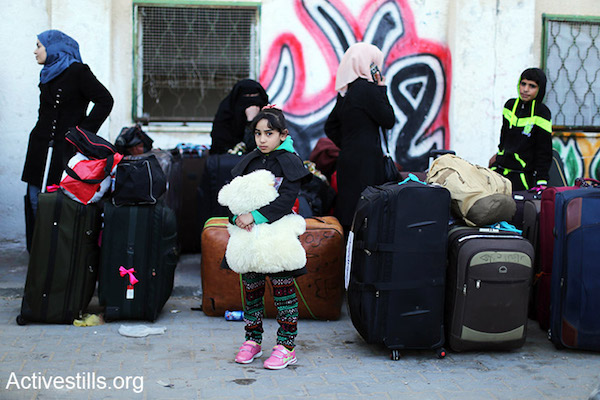After countless pleas to the Israeli government went unanswered, a group of Israelis who live along the Gaza border ask Ban Ki-moon to intervene and end the siege on their neighbors.

A group of Israelis who live in the Gaza border region sent a letter to UN Secretary-General Ban Ki-moon last week imploring him “to use the power of your office to pressure the Israeli government into adoption of a humanitarian and moral plan that will give hope to peoples on both sides of the border.”
Activists from the group Other Voice, which penned the letter to Ban, say they have sent countless letters and petitions to the Israeli government asking it to change its policy vis-à-vis Gaza for the betterment of both peoples, but say their pleas have gone unanswered. Therefore, they write, because the blockade is “a ticking bomb for all of us – Israelis and Palestinians – who live in the region,” they had no choice but to seek outside help.
“[The blockade] keeps nearly 1.8 million people locked up in a small piece of land,” the Israeli residents of the Gaza border region wrote to Ban. “This governmental policy has left the Palestinians in Gaza with little to no opportunities to meet their most basic needs, and of course, constitutes a gross violation of their human rights, as set forth by the UN Declaration of Human Rights, to which Israel is a signatory.”
“Since 2008, our area has known three wars,” the letter continued. “Each one of these wars has scarred Israeli society… The physical and psychological harm that these wars have caused Israelis is debilitating, but the physical and psychological destruction that this has caused the civilian population in Gaza is horrendous.”
The residents of southern Israel also mentioned in their letter reports of humanitarian issues in Gaza like dangerously diminishing drinking water reserves, 16-hour daily power outages, and the fact that 80 percent of the population is dependent on international aid. They further noted that senior Israeli security officials have warned recently that the situation in Gaza endangers Israel and necessitates immediate steps toward easing the humanitarian and economic crises in the Strip.
One might add to that the fact that the UN itself has determined that the Gaza Strip is in danger of becoming uninhabitable within four years, and that abject poverty and unemployment is pushing Gazans to attempt to emigrate in large numbers — legally and illegally. A report by Israel’s Channel 2 News last week noted that there has been a rise in suicides in Gaza and a rise in domestic violence.
The world’s largest open-air prison
Israel’s siege on the Gaza Strip, supported by Egypt, has been in place for nearly 10 years, including a complete sea, land and air blockade and the destruction of Gaza’s single airport. And despite the fact that Israel withdrew its troops from the Strip, it still controls the currency (shekels). It still controls the electricity and water. It still manages the population registry.

Israel limits the area in which Gazan fisherman can fish off their own coast, and the area in which farmers can farm. Just last week, the Israeli Navy fired on Gazan fishermen and wounded one, and it was recently exposed here in +972 that the Israeli army has been spraying herbicides in the vicinity of Gaza farmland, destroying crops. It is the Israeli army that bars Gazans from enjoying 3G mobile Internet (not to mention 4G). It controls the crossing of people and goods to the West Bank, which is considered part of the same territory. And that’s without getting into the recent wars, the destruction, the killing of more than 2,000 people in one war alone, including hundreds of children and the killing of more than 140 entire families.
It’s no coincidence that people — including the Israeli media — call Gaza “the largest prison in the world.”
On a side note, a young conscientious objector, Tair Kaminer, is currently in Israeli military prison. Before refusing to join the Israeli military she spent a year volunteering in Sderot, one of the Gaza border communities hardest hit by the conflict over the past decade. She said the following about her experience in that community before being sentenced to military prison:
“Many children who grow up in Gaza or in the West Bank, in an even more difficult environment, learn to hate the other side. They, too, cannot be blamed. When I look at all of these children, and the next generation on both sides and the reality in which they grow up, I see only more trauma and pain. And I say enough! That is why I refuse: so that I do not take an active part in the occupation of the Palestinian territories and the injustices that the Palestinian people face under occupation, so that I do not take part in this circle of hate in Gaza and Sderot.”
This article was first published in Hebrew on Local Call. Read it here.

